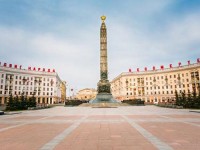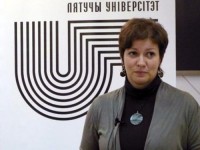We present a collection of articles “Civil society in Belarus 2015-2021: from stable development to new challenges”.
Civil society in Belarus 2015-2021: from stable development to new challenges

We present a collection of articles “Civil society in Belarus 2015-2021: from stable development to new challenges”.
This collection of articles was meant initially to be an already traditional review of Belarusan civil society’s condition and development in the previous period. The focus of our attention had to include the years 2015-2020 — the period rather favorable both for the third sector and for the economic and social development of Belarus as a whole. A new political “thaw” was started in 2014-2015 and lasted 5 years; despite want of structural reforms and intrinsic changes of the character of political power in the country, the economic and institutional conditions for the development of the mass media, business, civil society organizations and initiatives did improve; the quantity of the degrees of freedom did increase.
However, the hopes of some experts, as well as figures of the third sector and business, who proclaimed a possibility of the Belarusan regime’s evolutionary “drift” into the democratic direction, happened to be futile. Pressure began to grow in 2019 when Russia started its “integration deepening” game, which questioned the preservation of Belarus’ sovereignty. Already back then, the most sagacious analysts warned that the year 2020 — the presidential election year — would become a turning point in the further development of the country. Its role in the strengthening of this pressure was played by the Belarusan authorities’ reaction to the COVID-19 pandemic — the reaction that was not essentially new, but which, however, did reveal to many Belarusans the regime’s real attitude towards its citizens who used to prefer not to pay attention to the question of who and how governs them and the country.
The result of these processes was the political crisis, the biggest one during the whole time of independent Belarus’ existence, which was accompanied by a high level of political mobilization throughout the election campaign, the most largescale and long-playing street protests, and the most wide-ranging repressions against the otherwise-minded. The protest movement was suppressed; people were killed; thousands of people happened to be imprisoned or sent into exile, to be fired or to receive the employment ban; hundreds of public organizations were liquidated; the independent mass media lost any possibility of any legal activity in the country; any activity independent of the state began to be persecuted. The country appeared in a situation of juridical default and international isolation; the law-enforcement system and adjudicatory bodies inviolately carry out repressive functions; at last — Belarus happened to be a participant of the war against Ukraine on the aggressor’s side.
Today, in 2022, it is obvious that neither Belarusan third sector, nor Belarus, nor Region as a whole will ever return to the former state of affairs. The events of 2020-2021 in Belarus and the war unleashed in February 2022 in Ukraine will one way or another lead to substantial changes, at least, in Europe. However, despite the global character of these changes, we consider it necessary to describe the processes, tendencies, and achievements that took place in Belarusan society and in the field of activity of public organizations during the previous period. The majority of the achieved results were washed off by the wave of the political crisis and the subsequent repressions; however, it does not lose its value because of that, and it is one of the keys to understand the current situation.
Therefore, the first part of this collection is dedicated to subjects, processes, and tendencies in the CSOs sphere in 2015-2020. The collection was compiled in a long and difficult way; some texts it includes were written in 2020 and then they were only supplemented a tad; some articles were written already in 2021 when the flywheel of repressions began working at its highest efficiency; therefore, they can seem a little bit patchy. Some authors of the collection, activists of CSOs, researchers, and analysts were compelled to leave the country; some of those who remain in Belarus are forced to resort to pseudonyms because of a threat of prosecution. Except the analysis of the development of public organizations and initiatives in the traditional logic of thematic lines of activity (ecology, social projects, culture, national minorities, etc.), in this section, we also tried to analyze some aspects and infrastructural processes that create new conditions for CSOs development — the changes of the media environment, the development of crowdfunding practices, the nascency of new types of social movements and communities caused by digitalization processes, etc. Besides, separate attention is paid to the development of CSOs in different areas of Belarus. It has to do with the traditional for Belarus disproportion in the development of the third sector between the capital and regions, which [disproportion] began to be overcome gradually in the years prior to the political crisis of 2020, and it seems important to us to mention these processes.
The second part of the collection is dedicated to the attempt of at least partially describing and comprehending the events of 2020-2021 per se — their preconditions, characteristic, and scales. A deep and systematic analysis of these processes is yet to come; today, Belarusan researchers have obviously not enough possibilities and tools for a full-fledged description of this dynamic period. The articles in this part can be rather debatable and even provocative, but we do hope that they will offer their mite not only to the fixation, but also to the understanding and interpretation of the intricate and antilogous processes of this period in Belarusan history.
Download text 
Others
-
A usual circle. No sanctions, no changes
After the abolition of the sanctions, the EU and Minsk will further expect from each other for the steps that no one is going to take. The situation in the country will not change; only the third force can affect it. If the Belarusan civil society doesn’t become this third force, then Russia will become it.
-
Letter from Minsk
Strategic Europe continues the second phase of its Capitals Series exploring how EU foreign policy is viewed by six countries in Europe’s Eastern neighborhood. Carnegie Europe asked contributors from each capital to give a candid assessment of the EU’s policies toward their country, with a ranking on a scale from “miserable” to “excellent.” The spotlight is on Belarus.
-
The Year of Belarusan thinking in the Flying University
We publish the speech of Tatiana Vadalazhskaya, a coordinator of the Flying University, during the first session of the university seminar in the 2015-2016 academic year.
-
Academic non-freedoms
In order to join the Bologna process in practice, Belarus needs institutional structural changes.








Comments
Andrei Yahorau — Al Jazeera: “Lukashenko is irresponsible”
He said Belarus would likely face economic tightening not only as a result of the coronavirus pandemic but also a Russian trade oil crisis that worsened this past winter.